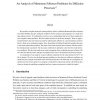Free Online Productivity Tools
i2Speak
i2Symbol
i2OCR
iTex2Img
iWeb2Print
iWeb2Shot
i2Type
iPdf2Split
iPdf2Merge
i2Bopomofo
i2Arabic
i2Style
i2Image
i2PDF
iLatex2Rtf
Sci2ools
103
click to vote
MOR
2008
2008
An Analysis of Monotone Follower Problems for Diffusion Processes
We consider a singular stochastic control problem, which is called the Monotone Follower Stochastic Control Problem and give sufficient conditions for the existence and uniqueness of a local-time type optimal control. To establish this result we use a methodology that has not been employed to solve singular control problems. We first confine ourselves to local time strategies. Then we apply a transformation to the total reward accrued by reflecting the diffusion at a given boundary and show that it is linear in its continuation region. Now, the problem of finding the optimal boundary becomes a non-linear optimization problem: The slope of the linear function and an obstacle function need to be simultaneously maximized. The necessary conditions of optimality come from first order derivative conditions. We show that under some weak assumptions these conditions become sufficient. We also show that the local time strategies are optimal in the class of all monotone increasing controls. As ...
Related Content
| Added | 13 Dec 2010 |
| Updated | 13 Dec 2010 |
| Type | Journal |
| Year | 2008 |
| Where | MOR |
| Authors | Erhan Bayraktar, Masahiko Egami |
Comments (0)

